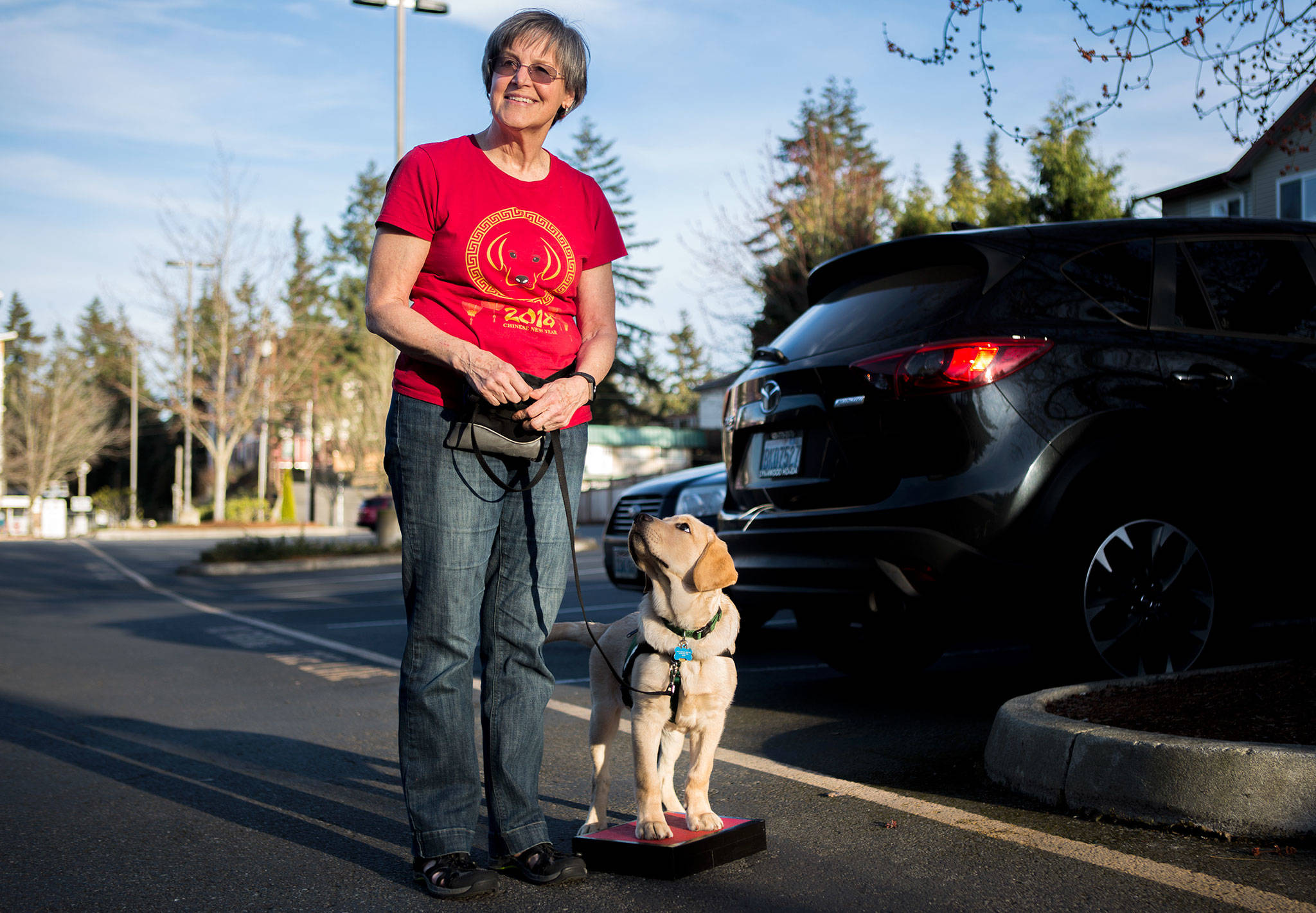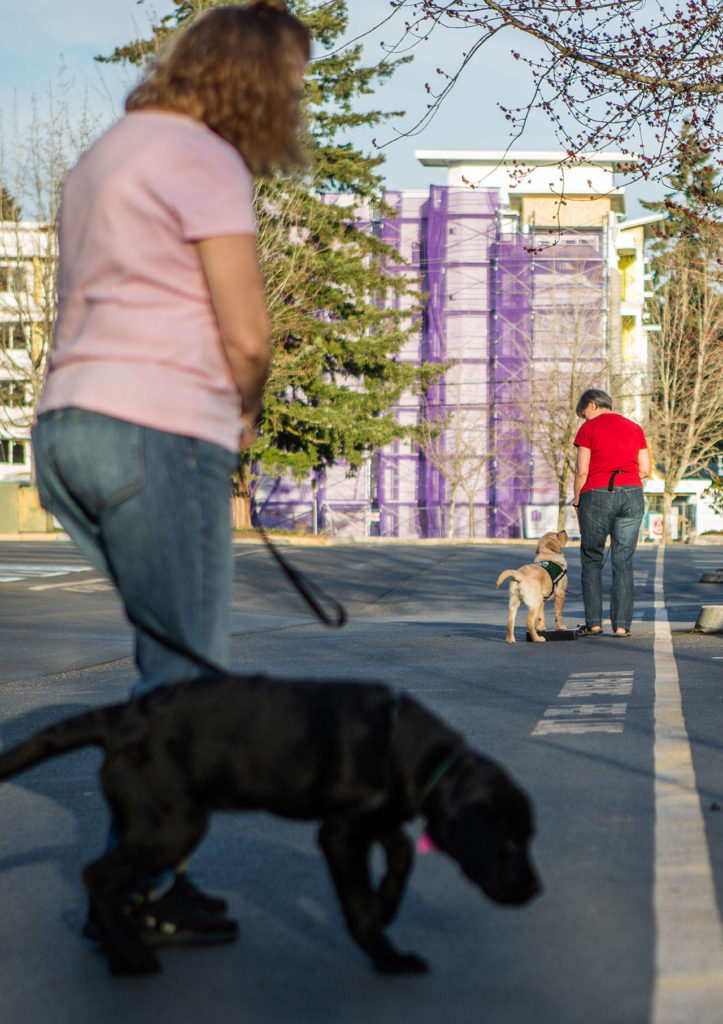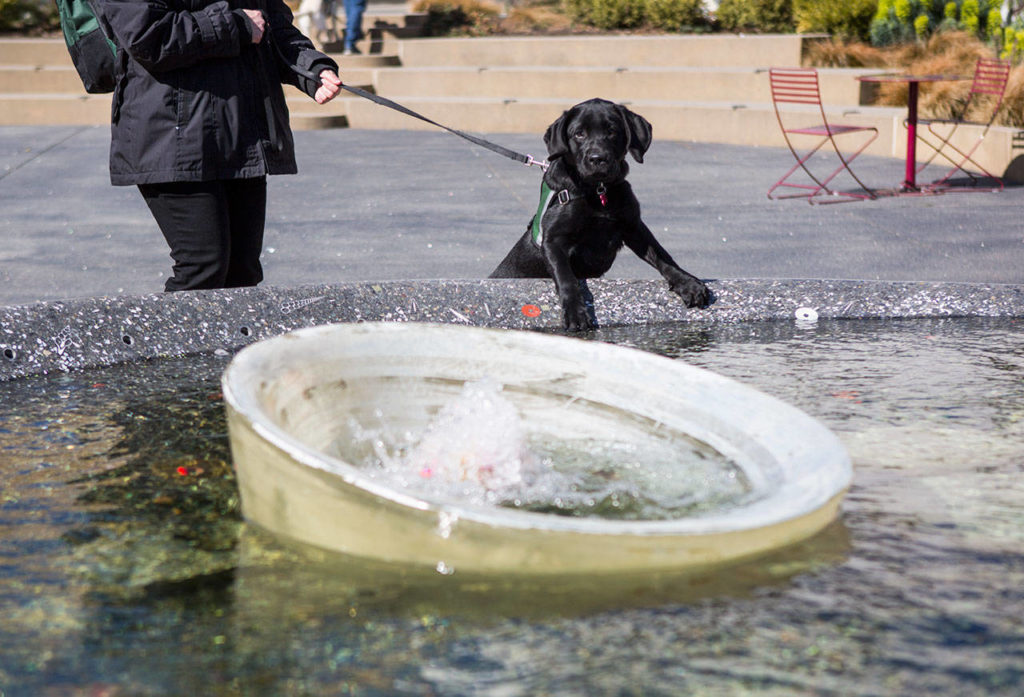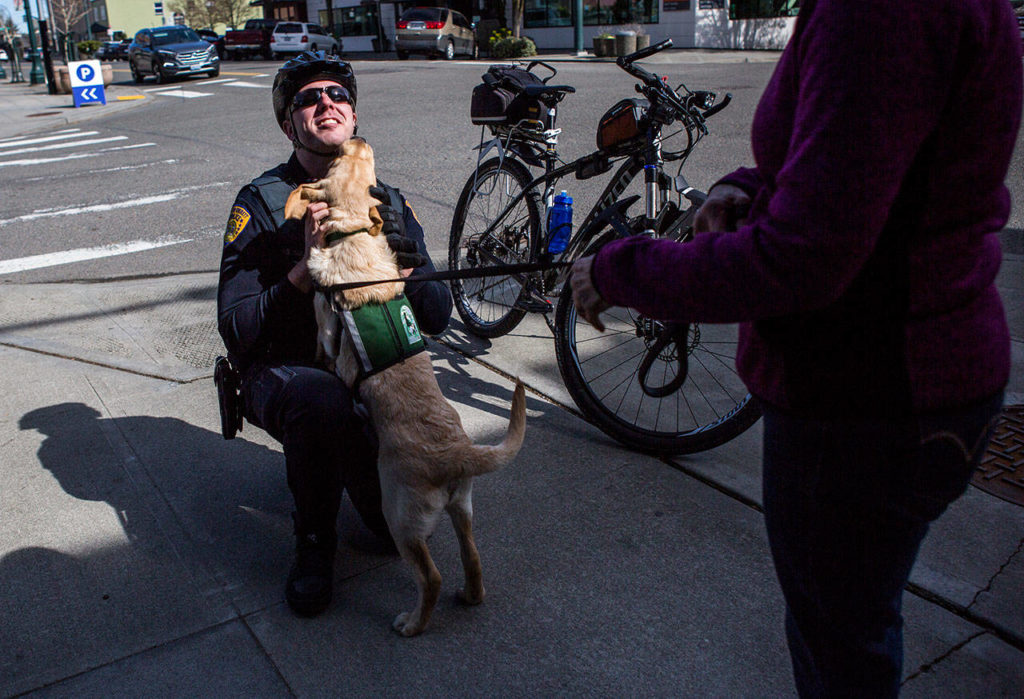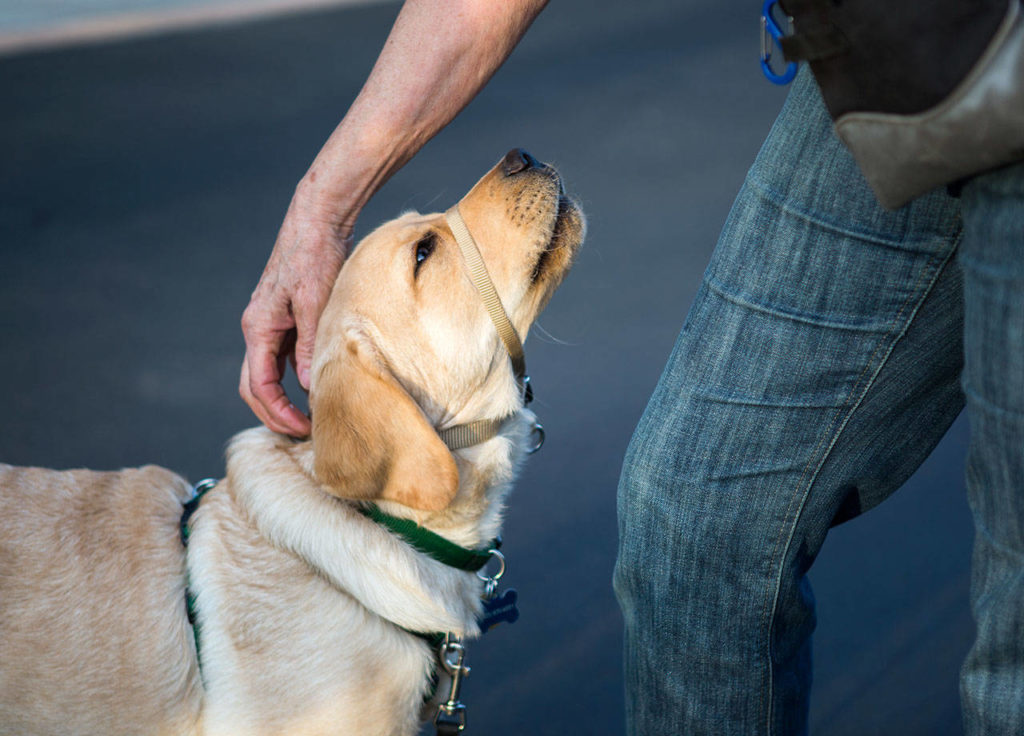EVERETT — His Yoda-like calm prevailed amid the fast-moving little legs and giant statues during Wednesday’s field trip to Funko.
Jedi, a 4-month-old yellow Labrador, was on a weekly outing with pals to prepare for a life of service.
The dogs will someday open doors, find the phone, unload groceries, fetch clothes from the dryer and other mobility tasks and provide companionship to people with disabilities.
First, the pups have to learn how to behave in public.
“They have to be calm and comfortable in different situations,” said Lindy Langum, instructor with Summit Assistance Dogs, a nonprofit that trains service dogs. “They learn that things are fun and awesome, and not scary.”
Not even 20-foot creatures with freaky heads and mega teeth. Hence the trip to Funko headquarters, a busy destination in downtown Everett.
“We try to go wherever is diverse for the dogs,” Langum said.
“They are public access dogs. They have to be socialized and confident in any kind of environment and be happy to go along with wherever we go.”
That’s Jedi. Not much ruffles his droopy jowls.
He’s one of 11 pups in a litter, all with J names, being fostered in homes by volunteers. Siblings in his “J-litter” include Juniper, Jacques and so on. Training starts after weaning, at about 8 weeks, and continues for two years.
Summit has placed 85 trained dogs since it started in 2000 in Anacortes. The wait for applicants to get a service dog is several years. Dogs, which run about $25,000 for training and lifetime care, are provided to clients at no cost.
Seattle resident Michelle Munro was paired with Hayden, a Lab-poodle mix, aka a Labradoodle, in 2006 from Summit.
Munro has an autoimmune rheumatic disorder that affects her balance and mobility.
“My life with the disease was getting smaller and smaller,” she said. “He brought joy back into my life.”
Hayden made it so she didn’t have to use a cane. He brought emergency medicine packs to her.
He made friends everywhere they went: plane rides, Amtrak trips, cruises to the Bahamas.
“He looked like Tina Turner on a bad hair day,” she said.
Hayden retired from service two years ago and died last year. Munro is waiting to get a successor.
Munro went from being a recipient of Summit to a board member and is now the president.
Summit has a paid staff, but relies on volunteers, donors and sponsors. The organization plans to build a training center on Whidbey Island.
Jedi’s foster person is Penny Potter, a Mukilteo retiree, who is rearing him during puppyhood. Jedi moved in with her six weeks ago. The only time he sees his littermates is during the Wednesday training. Even then, mingling is kept to a minimum.
The goal is for these pups, who are friendly pack animals by nature, to ignore the public and other dogs. Jedi is already a master of this. A loud motorcycle turns his head a tad. Not much else does.
Before going into Funko, the dogs walked around Wetmore Theater Plaza with their humans. Juniper was fascinated by water splashing in the fountain. Jedi nabbed a burger wrapper that blew by his snout. He quickly dropped it when Potter said a command word followed by a dog treat. Same with the rock he tried to eat.
For those fostering, it involves housebreaking and hugging, yet is different than having a family pet. No cozying on the couch and watching TV.
“He can’t jump on my lap,” Potter said. “He can’t sleep on the bed.”
When Potter takes Jedi to Starbucks to meet up with her friends, the dog sits off to the side, like a patient husband.
“He needs to spend time doing what we say ‘settle,’ ” she said. “Sit with you without any treats, without any attention, just chill.”
Jedi is pretty chill. Just like his dad, Theo, who is part of the Summit program, as is his mom, Stitches.
Dogs are screened for acceptance.
“We’re going for temperament,” Langum said. “We’re not going for perfect colors or looks. We’re also going for healthy genetics.”
Litters are often named in a theme or a letter.
Summit worker Mike Powers brought Isaiah, an 18-month-old Lab from the “I-litter,” to the Funko outing.
Isaiah is in intermediate training.
“A very sweet guy. I’ve had him for about four months,” said Powers, a trainer and former volunteer. “He’s still a little bit of teenagerish.”
Jedi got most excited about meeting Everett Police Officer Shane Nelson on a bike outside of Funko. Nelson got pretty excited, too.
Jedi will live with Potter until he’s about a year old, then possibly go to prison, if there is a bed for him there. An intensive nine-week program at Monroe Correctional Complex not only trains dogs, it helps inmates to train dogs.
After that, the dogs learn more specific skills.
In the end, not all dogs make the cut. Some get a “career change.” A polite term for being “just a pet.”
Potter’s background is in art history and mental health. She and her husband, Richard, had dogs as pets while raising two sons.
She has fostered puppies and done respite care in her four years as a Summit volunteer.
“This is my alternative to get my doggy fix,” she said.
It also means letting go. “I am getting better about detaching from them.”
Pretty much as soon as a pup goes off to prison or advanced training, Potter gets another. She picked up Jedi the same snowy day in February as she delivered Irene (from the “I-litter”) to the next-level trainer.
Irene was also at the Funko outing, but with a new person now.
Langum said more foster puppy raisers are needed. They must attend a weekly session. Classes are in Seattle, Redmond, Lynnwood, Anacortes and Kitsap County. Outings vary.
Summit covers vet bills and gear. Volunteers pay for food.
Home visits from Summit staff provide advice.
Potter said she had a lot of questions starting out.
“I asked, ‘What do I do if they chew a shoe?’ ” Potter said.
“She said, ‘Well, you take a newspaper and roll it up … and hit yourself in the head. Because the shoe shouldn’t have been there in the first place.’ ”
Andrea Brown: abrown@heraldnet.com; 425-339-3443. Twitter @reporterbrown.
Talk to us
> Give us your news tips.
> Send us a letter to the editor.
> More Herald contact information.
